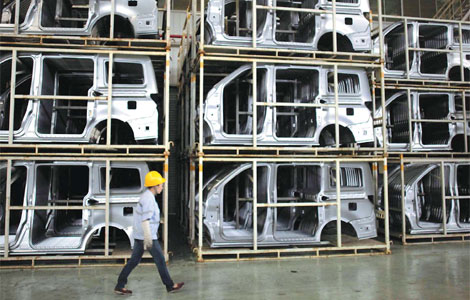China's economy might be No 1 in 2030
Updated: 2013-06-07 07:52
(China Daily)
|
|||||||||||
One possible crunch time for China could be around 2015 and 2016 when a lot of local government debt - where China's overall debt has become centered - has to be repaid or rescheduled.
"People have kept reminding me since I wrote the book that the investment bust hasn't happened yet but there is always a risk of it and that would slow growth."
Magnus, senior independent economic adviser at UBS in London, believes it is possible China could become the world's biggest economy by 2018 and twice as big by 2030, but they are more like "spreadsheet" calculations.
"There is a danger of it being just a mathematical exercise. You could have a scenario where China grew by 8 percent one year and then by 4 percent in four successive years or smoothly by 5 percent in five successive years. You would get the same outcome but it would be a very different type of growth since the first type would involve a significant slowdown."
The quality of China's growth is something that concerns Gary Liu, executive director of CEIBS Lujiazui Institute of International Finance in Shanghai.
"The problem is not about how big the Chinese economy can become but the quality of that growth.
"I believe that quality is bad in China and it has been at the cost of people's health. You can feel how bad the air and water quality are. I am afraid in the coming years we will see more people get serious diseases - even cancer - in China. This is not a small issue."
Liu believes Hu's prediction of China becoming double the size of the US is off the scale, and he doesn't expect China to even get to the same level until 2033.
"There is a danger of underestimating the strength of the US economy and its ability to innovate. It will probably begin to grow again by 3 or 4 percent or even higher. If that happens and China slows down, it is going to take a while to catch up."
Duncan Innes-Ker, senior China analyst for the London-based Economist Intelligence Unit, argues that there would have to be significant improvements in China's business environment before China could make such a rapid advance.
"There needs to be major reform of the legal system and regulatory environment to put China on a level with developed countries."
He believes the Chinese economy faces significant future headwinds, particularly with its labor force shrinking by 11 percent from 798 million in 2013 to 718 million in 2030. He expects China to catch up with the US by 2023; but as to when it is double the size, he said is out of his forecasting range.
"Growth won't be easy in the coming two decades and I expect it to slow to 3.7 percent in the 2020s as the labor force shrinks. China has experienced the classic catch-up when it was easy to grow by just catching the low-gathering fruit. It now needs to up its game."
In China 2030, Hu takes the view China's State-owned enterprises, which dominate the major sectors of the economy, are a strength and not a weakness. He points out that 64 of the Fortune 500 companies are now Chinese State-owned enterprises and remain a driving force of the economy.
But Xu Bin, professor of economics and finance and associate dean at CEIBS in Shanghai, insists China's SOEs are actually a barrier to growth and that many ought to be privatized.
"There is little doubt that the success of the Chinese economy will be closely associated with the reform of the State-owned sector. Without a vigorous private sector, there is no future for the Chinese economy.
"It needs to be driven by innovation and there is no way that this can be accomplished by State-owned enterprises."
Xu, who nonetheless believes China's GDP will overtake that of the US by 2018, believes growth could fall below 4 percent in the 2020s as the economy suffers from the "convergence effect" - the nearer it gets to the world's technology frontier, the slower its growth rate becomes.
"The export-led model has come to an end for China. China is already an upper-middle-income country, and the room for catch-up is significantly smaller than 30 years ago."
Related Stories
China, Mexico pledge to deepen ties on economy, trade 2013-06-05 19:39
China, India to make new engine of world economy 2013-05-20 04:48
China trades more with emerging economies 2013-05-10 02:39
Chinese economy stabilizes after slowdown 2013-05-07 23:30
China needs to rebalance economy: economists 2013-04-04 21:43
Today's Top News
China's economy might be No 1 in 2030
355,000 parents have lost only children
Russian President Putin, wife announce divorce
Xi: Strengthen trade links with Mexico
Top global enterprises welcomed
Gold miners held in Ghana
China, Vietnam set up naval hotline
More students looking overseas
Hot Topics
Lunar probe , China growth forecasts, Emission rules get tougher, China seen through 'colored lens', International board,
Editor's Picks

|

|

|

|

|

|





